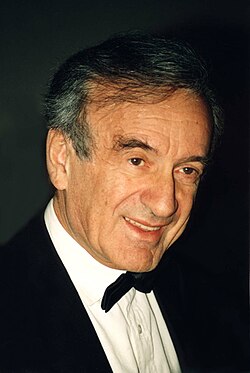Elie Wiesel Quote
Related Quotes
While police internal affairs is allowed to protect corrupt police officers that engage in unethical behaviors, illegal activities or murder, there will always be a genuine mistrust by the common peop...
Steven Magee
Tags:
activities, affairs, allowed, always, behaviours, common, common man, corrupt, corruption, engage
The confusion boys experience about their identity is heightened during adolescence. In many ways the fact that today's boy often has a wider range of emotional expression in early childhood, but if f...
Bell Hooks
Tags:
adolescence, bell hooks, feminism, feminist, masculinity, men, men and women, mental illness, murder, teenagers
Scientists and inventors of the USA (especially in the so-called "blue state" that voted overwhelmingly against Trump) have to think long and hard whether they want to continue research that will help...
Piero Scaruffi
Tags:
atrocities, dictator, doomed to repeat it, engineering, fascism, freedom, history, hitler, holocaust, illness
About Elie Wiesel
Eliezer "Elie" Wiesel (September 30, 1928 – July 2, 2016) was a Romanian-born American writer, professor, political activist, Nobel laureate, and Holocaust survivor. He authored 57 books, written mostly in French and English, including Night, a work based on his experiences as a Jewish prisoner in the Auschwitz and Buchenwald concentration camps.
In his political activities Wiesel became a regular speaker on the subject of the Holocaust and remained a strong defender of human rights during his lifetime. He also advocated for victims of oppression including Soviet and Ethiopian Jews, the apartheid in South Africa, the Bosnian genocide, Sudan, the Kurds and the Armenian genocide, Argentina's Desaparecidos or Nicaragua's Miskito people. He was a strong supporter of the state of Israel and was personally close to Benjamin Netanyahu.
He was a professor of the humanities at Boston University, which created the Elie Wiesel Center for Jewish Studies in his honor. He helped establish the United States Holocaust Memorial Museum in Washington, D.C.
Wiesel received awards including the Nobel Peace Prize in 1986. He was a founding board member of the New York Human Rights Foundation and remained active in it throughout his life.
In his political activities Wiesel became a regular speaker on the subject of the Holocaust and remained a strong defender of human rights during his lifetime. He also advocated for victims of oppression including Soviet and Ethiopian Jews, the apartheid in South Africa, the Bosnian genocide, Sudan, the Kurds and the Armenian genocide, Argentina's Desaparecidos or Nicaragua's Miskito people. He was a strong supporter of the state of Israel and was personally close to Benjamin Netanyahu.
He was a professor of the humanities at Boston University, which created the Elie Wiesel Center for Jewish Studies in his honor. He helped establish the United States Holocaust Memorial Museum in Washington, D.C.
Wiesel received awards including the Nobel Peace Prize in 1986. He was a founding board member of the New York Human Rights Foundation and remained active in it throughout his life.
